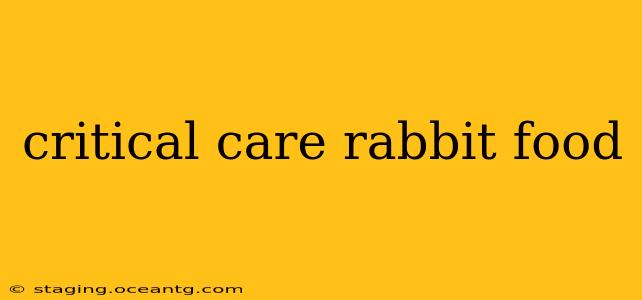Rabbits are delicate creatures, and ensuring they receive proper nutrition is crucial, especially during critical illness or recovery. Providing the right critical care rabbit food can mean the difference between life and death. This comprehensive guide explores the essential aspects of feeding rabbits in critical care situations, addressing common concerns and providing practical advice for owners.
What Constitutes Critical Care for Rabbits?
Before diving into food specifics, let's define what constitutes a critical care situation for rabbits. This includes but isn't limited to:
- Severe illness: Conditions such as GI stasis, infections, or trauma necessitate immediate and specialized nutritional intervention.
- Post-surgical recovery: After surgery, rabbits need easily digestible food to support healing and prevent complications.
- Anorexia: A prolonged lack of appetite can quickly lead to life-threatening consequences due to their rapid metabolic rate.
- Weight loss: Significant weight loss signals a serious health issue requiring immediate attention and dietary adjustments.
Understanding the underlying cause of the critical situation is paramount. A veterinarian should always be consulted before making any significant changes to a rabbit's diet, especially during a medical emergency.
What to Feed a Rabbit in Critical Care?
The goal of critical care rabbit food is to provide easily digestible calories and essential nutrients without overwhelming the digestive system. This often involves a transition to a "critical care" diet, which may include:
- Critical Care formula: Commercially available critical care formulas (often in powder form) are specifically designed to meet the nutritional needs of rabbits in critical situations. These formulas are easily mixed with water to create a paste, making them readily digestible. They are rich in calories, fiber, and essential nutrients.
- High-quality hay (limited amounts): While hay is a staple in a rabbit's diet, during critical illness, the amount may need to be restricted to avoid overwhelming the digestive system. Choose a soft, high-quality hay that's easy to digest. Timothy hay is generally recommended.
- Fresh herbs (carefully selected): Some fresh herbs, like parsley and cilantro (in small quantities), can be offered to encourage appetite and provide additional nutrients, but always check with your vet first.
- Baby food (pureed): Certain plain, unsweetened baby foods, such as sweet potato or pumpkin puree, can be offered in small amounts as supplemental nutrients. Always check the ingredients to ensure they are free of added sugars, salts, and onions.
Important Note: Avoid giving your rabbit foods that are high in sugar, fat, or protein, as these can worsen digestive issues.
What are the Best Critical Care Rabbit Food Options?
There are several commercially available critical care rabbit formulas; however, consulting with your veterinarian is crucial to determine the best option for your rabbit's specific condition and needs. Your vet can assess the rabbit's overall health and recommend the most appropriate critical care diet.
How Often Should I Feed My Rabbit Critical Care Food?
The frequency of feeding will depend on the severity of your rabbit's condition and your veterinarian's recommendations. It might involve several small feedings throughout the day or even syringe feeding if necessary. Regular monitoring is crucial to ensure the rabbit is eating and maintaining weight.
Can I Make My Own Critical Care Rabbit Food?
While you might find numerous homemade recipes online, it is strongly discouraged to attempt making your own critical care rabbit food. Commercial formulas are meticulously formulated to provide a balanced nutritional profile essential for recovery. Homemade alternatives often lack essential nutrients and may even be harmful to your rabbit's health.
How Long Should My Rabbit Be on Critical Care Food?
The duration of critical care feeding varies depending on the individual rabbit's condition and response to treatment. It might last for a few days or several weeks. Your veterinarian will gradually transition your rabbit back to a regular diet once they are stable and have regained a healthy appetite.
What if My Rabbit Still Isn't Eating After Starting Critical Care?
If your rabbit remains anorexic despite being on critical care food, immediate veterinary intervention is necessary. Underlying health problems may need to be addressed, and further support may be required to stimulate their appetite. This may include administering fluids and medication.
My Rabbit is Refusing Critical Care, What Should I Do?
Some rabbits may initially refuse critical care food due to taste or texture. Try warming it slightly to improve palatability. You can also work with your vet to find alternative feeding methods or supplement with other palatable options. However, if refusal persists, veterinary intervention is crucial to prevent further deterioration.
In conclusion, critical care rabbit food is a vital tool in managing serious illness and promoting recovery in rabbits. Close collaboration with your veterinarian, diligent monitoring, and a well-structured feeding plan are key to a positive outcome. Remember, early intervention and professional guidance are paramount in ensuring the health and well-being of your beloved pet.
